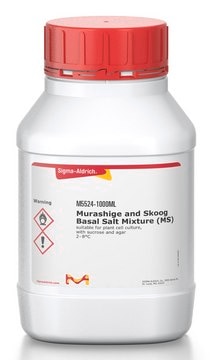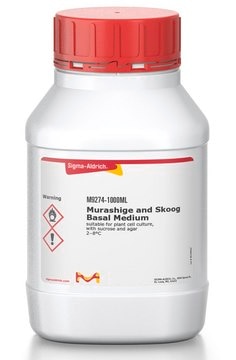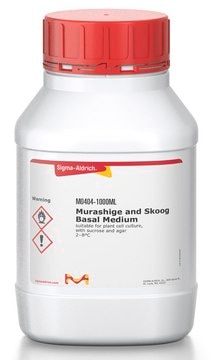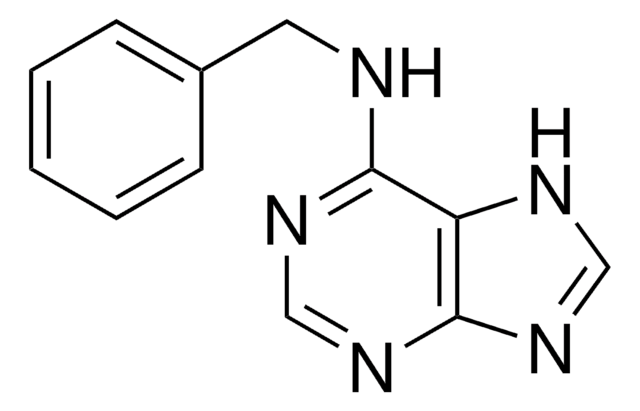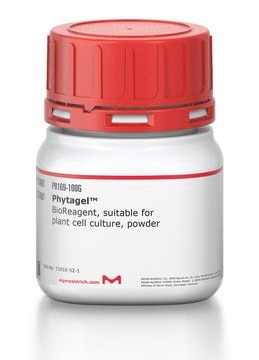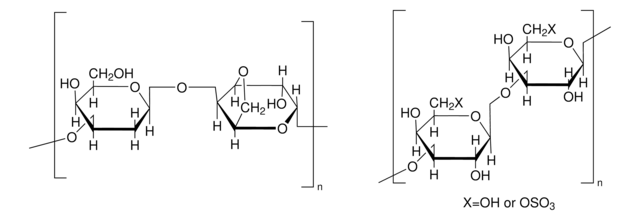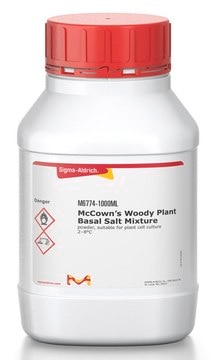M5519
Murashige and Skoog Basal Medium
powder, suitable for plant cell culture
Synonym(s):
MS0 Medium, MSO Medium, MS Basal Medium
Sign Into View Organizational & Contract Pricing
All Photos(1)
About This Item
Recommended Products
form
powder
Quality Level
technique(s)
cell culture | plant: suitable
application(s)
agriculture
storage temp.
2-8°C
Looking for similar products? Visit Product Comparison Guide
Related Categories
General description
Murashige and Skoog medium is a widely used plant tissue culture growth medium. M&S Basal Medium contains macronutrients that include high levels of nitrate and organic additives such as agar, sugars, vitamins and growth regulators. Important growth regulators frequently added to M&S include IAA (auxin/morphogen) and the Kinetin (cytokinin/cell division promoter).
Application
Murashige and Skoog medium has been used in plant tissue culture medium for plant transformation study.
Formula variant
With the macro- and micronutrients, and vitamins as described by Murashige and Skoog (1962).
Media Formulation
Media Formulation
Quantity
Formulated to contain 4.4 grams of powder per liter of medium.
Preparation Note
Murashige and Skoog medium can be reconstituted from powder or by combining products that are major components of complete M&S medium, such as macronutrient mixtures and vitamin mixtures. Murashige and Skoog medium (M5519) contains the micronutrients and vitamins of the original classic formulation. It can be supplemented with sucrose, agar, auxins (IAA) and cytokinins (Kinetin) to generate a complete medium for growth plant tissue culture.
related product
Product No.
Description
Pricing
signalword
Warning
hcodes
Hazard Classifications
Eye Irrit. 2 - Ox. Sol. 3
Storage Class
5.1B - Oxidizing hazardous materials
wgk_germany
WGK 2
flash_point_f
Not applicable
flash_point_c
Not applicable
Certificates of Analysis (COA)
Search for Certificates of Analysis (COA) by entering the products Lot/Batch Number. Lot and Batch Numbers can be found on a product’s label following the words ‘Lot’ or ‘Batch’.
Already Own This Product?
Find documentation for the products that you have recently purchased in the Document Library.
Customers Also Viewed
Suji Somasundaram et al.
Plant & cell physiology, 61(7), 1321-1334 (2020-05-08)
HKT1;5 loci/alleles are important determinants of crop salinity tolerance. HKT1;5s encode plasmalemma-localized Na+ transporters, which move xylem Na+ into xylem parenchyma cells, reducing shoot Na+ accumulation. Allelic variation in rice OsHKT1;5 sequence in specific landraces (Nona Bokra OsHKT1;5-NB/Nipponbare OsHKT1;5-Ni) correlates
M Guan et al.
Journal of experimental botany, 66(1), 203-212 (2014-10-16)
Nitrogen (N) remobilization from reserves to sinks is essential for seedling establishment and seed production. Cytosolic glutamine synthetase (GS1) is up-regulated during both seed germination and seed filling in plants. However, the specific roles of the individual GS1 isogenes with
Ajay Kumar et al.
BMC genomics, 13, 597-597 (2012-11-07)
Development of a high quality reference sequence is a daunting task in crops like wheat with large (~17Gb), highly repetitive (>80%) and polyploid genome. To achieve complete sequence assembly of such genomes, development of a high quality physical map is
In vitro assay for ABA 8'-hydroxylase: implications for improved assays for cytochrome P450 enzymes.
Joan E Krochko et al.
Methods in molecular biology (Clifton, N.J.), 773, 113-134 (2011-09-08)
In vitro assays for cytochrome P450 enzymes developed from plant-derived microsomal extracts have not been used extensively for the characterization and quantification of enzyme activities in plant tissues. We describe here an in vitro assay for abscisic acid (ABA) 8'-hydroxylase
Amr R A Kataya et al.
PloS one, 12(7), e0180478-e0180478 (2017-07-06)
Eukaryotic protein phosphatase 4 (PP4) is a PP2A-type protein phosphatase that is part of a conserved complex with regulatory factors PSY2 and PP4R2. Various lines of Arabidopsis thaliana with mutated PP4 subunit genes were constructed to study the so far
Our team of scientists has experience in all areas of research including Life Science, Material Science, Chemical Synthesis, Chromatography, Analytical and many others.
Contact Technical Service